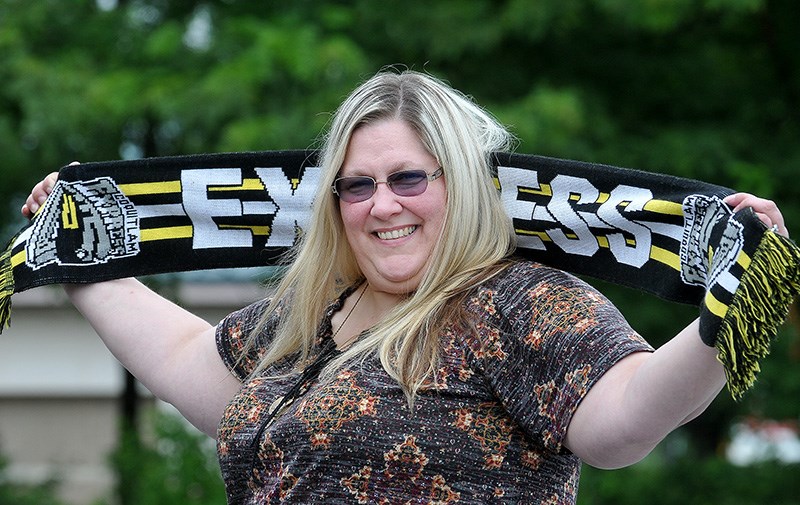Catherine Polonio calls the Coquitlam Express her “boys.” But she’s much more than a super fan.
For some of the players, she’s their “West Coast Mom.”
Polonio and her husband, Mark Siljander, are billets, providing a home away from home for one or two players on the team as they chase their hockey dreams hundreds and sometimes thousands of kilometres from their own families.
It’s a weighty and sometimes challenging responsibility, especially for a couple who’s never had kids of their own and have no previous experience navigating the ups and downs of adolescence and burgeoning adulthood.
It’s also endlessly rewarding, Polonio said.
“If I can make a difference in the kid’s life, that’s what matters,” she said. “I can be a stepping stone to achieving their dreams.”
Polonio didn’t set out to become a billet. She’s loved hockey her whole life, attended Vancouver Canucks games with her dad when she was a kid and supported the hometown BC Junior Hockey League team as an adult. It was a chance conversation four years ago with Express president Mark Pettie that deepened her relationship with the team.
No sooner had she told him of her affection for the Express, when Pettie hit her up to become a billet, providing shelter, food, transportation and — quite often —counsel, guidance and encouragement to a couple of players from out of town— in other words all the things a parent might do.
“You’re looking for somebody who wants to be their family,” Pettie said. “It’s not just opening up a bedroom, you’re there for a little bit of support.”
Pettie said the Express requires 10 to 12 families to billet one or two players for a season. The commitment includes making sure they eat right, get to and from practices and games, as well as attend school if they’re still in school.
In return, the Express helps defray some of the cost of groceries, and the billet family receives a season ticket package as well as invites to special events like the team’s awards banquet at the end of the season.
Polonio admits she and her husband had no idea what they were doing when they first opened their door to a pair of hulking young men with big appetites and bigger dreams to achieve the next level on their hockey journey. They just went on instinct.
“Right from the get-go, I let them know it’s my house, it’s my rules,” Polonio said. “I treat them like they were my own kids.”
When her first two players were traded, they were replaced by a big 6’5” 18 year-old who ate everything in her kitchen.
While some players alight in Polonio’s home only briefly, others return every year they’re with the team. Like Noah Turansky, who stayed three seasons and even learned how to drive in Polonio’s car.
Over family dinners, excursions to Whitecaps’ and BC Lions games, post-game pizzas, drives to and from the rink or school, and even providing one player with a part-time job, the bond between the young men and their host family tightens.
Pettie said having good billet families that provide good experiences can help recruiting down the line.
“Parents do ask that question,” he said. “If they hear there’s good billet families, it helps us in attracting players.”
Polonio said she’s had to learn all her players’ quirks, superstitions and dietary needs, like Riley Johnson’s affection for Pop-tarts.
“I never had to buy Pop-tarts before in my life,” Polonio said.
That bond often continues after players leave the team with email, text and Facetime, even visits to a player’s new hockey environs at university or the next level of junior hockey to catch up and see how they’re doing.
It’s all about fuelling their aspirations, Polonio said.
“These boys live and breathe hockey,” she said. “That’s a lot to ask from a young man.”
And creating a positive experience for what many of them is their first time living away from home, is an important step into turning those players into men, Pettie said.
“Part of this process is making them independent and accountable,” Pettie said. “That’s how you make a good team and make these kids good people.”
• The Express could still use some families to billet players for the coming season. To learn more about becoming a billet family go to https://www.coquitlamexpress.ca/billet-families-volunteers



